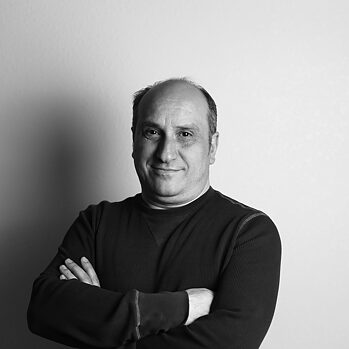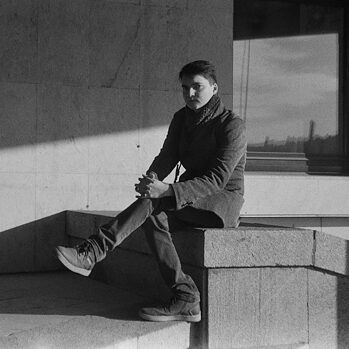... and the Novosibirsk paper architecture
The guest of our second conversation is one of the leaders of Novosibirsk paper architecture; the artist, curator, and participant of numerous international exhibitions, Vyacheslav (Slava) Mizin (Novosibirsk, Russia). Vyacheslav started experimenting with utopian fantasy architecture while studying at the Novosibirsk construction engineering institute in the 1980s, which eventually led him to modern art. We talked about the cultural situation in which paper architecture was born in Novosibirsk, about the fantastic metamorphoses in the development of modernism in Siberia, about the transition from Soviet modernism to postmodernism, about the college atmosphere of the time, and about perspectives of Siberian punk-porno-trash architecture.
This podcast has been commissioned by Goethe-Institut Novosibirsk as preparation for the Siberian opening of the exhibition, “The City of Tomorrow”, which is the result of many years of study of Soviet architectural modernism in the post-Soviet space. In 2019, the Goethe-Institut showed the exhibition in Minsk, Yerevan, and Moscow. In Novosibirsk the exhibition will be displayed in the Centre for Culture CC19 from 24 November 2020 to 24 January 2021.The exhibition encapsuates a long period of time, from 1920s constructivism to the Soviet modernism of the second half of the 20th century, and ends with the transition to the post-modernist architecture of the early 1990s. Presenting the podcast is the Novosibirsk artist and curator, Anton Karmanov.
Vyacheslav Mizin
Vyacheslav Mizin is an artist, curator, alco-hermeneut, and participant of the Blue Noses art group. In 1984, he graduated from the architecture department of the Kuibyshev Novosibirsk construction engineering institute (Sibstrin). From 1984-1992, he was one of the leaders of the group of paper architects in Novosibirsk, who developed the principles of new ‘cynical’ form-building, of modern architectural plagiarism, and of free tectonic manipulation. He has been involved in artistic activities since the early 1990s. He was the curator of the Siberian branch of the National Centre for Contemporary Arts in 2010-2014, and the director of the Siberian branch of the National Centre for Contemporary Arts in 2013-2019. Now he is a senior curator at the Centre for Culture CC19. He participated in numerous Russian and international projects: the 50th and 51st Venice Biennale; the 1st, 2nd, and 3rd Moscow Biennale; the 7th Istanbul Biennale; the Russia! exhibition at the Guggenheim Museum in Bilbao; The Valencia Biennale 2001; the Cetinje Biennale in Montenegro 2002; the Prague Biennale 2007; the Baltic Triennial in Vilnius 2002; etc. His works are represented in the collections of the Tretyakov Gallery, the National Centre for Contemporary Arts, the Russian Museum, the Moscow Museum of Modern Art, the Pushkin Museum, the Ludwig Museum (Budapest), Kiasma Museum of Contemporary Art (Helsinki), the MAK Museum of Applied Arts (Vienna), the Centre Pompidou (Paris), and other institutions. He lives and works in Novosibirsk.












